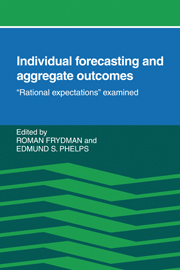Book contents
- Frontmatter
- Contents
- List of contributors
- Preface
- 1 Introduction
- 2 The trouble with “rational expectations” and the problem of inflation stabilization
- 3 Expectations of others' expectations and the transitional nonneutrality of fully believed systematic monetary policy
- 4 The stability of rational expectations in macroeconomic models
- 5 Individual rationality, decentralization, and the rational expectations hypothesis
- 6 Convergence to rational expectations equilibrium
- 7 A distinction between the unconditional expectational equilibrium and the rational expectations equilibrium
- 8 On mistaken beliefs and resultant equilibria
- 9 Equilibrium theory with learning and disparate expectations: some issues and methods
- 10 Keynesianism, monetarism, and rational expectations: some reflections and conjectures
- Index
5 - Individual rationality, decentralization, and the rational expectations hypothesis
Published online by Cambridge University Press: 05 June 2012
- Frontmatter
- Contents
- List of contributors
- Preface
- 1 Introduction
- 2 The trouble with “rational expectations” and the problem of inflation stabilization
- 3 Expectations of others' expectations and the transitional nonneutrality of fully believed systematic monetary policy
- 4 The stability of rational expectations in macroeconomic models
- 5 Individual rationality, decentralization, and the rational expectations hypothesis
- 6 Convergence to rational expectations equilibrium
- 7 A distinction between the unconditional expectational equilibrium and the rational expectations equilibrium
- 8 On mistaken beliefs and resultant equilibria
- 9 Equilibrium theory with learning and disparate expectations: some issues and methods
- 10 Keynesianism, monetarism, and rational expectations: some reflections and conjectures
- Index
Summary
In a series of studies, Hayek (1948b,c,d) provided a profound analysis of market processes. He argued that “the economic problem which society faces … is emphatically not” the problem of economic calculus of individual choice. “It is a problem of utilization of knowledge which is not given to anyone in its totality” (Hayek, 1948c, pp. 77–8). Furthermore, Hayek emphasized that the fundamental characteristic of decentralized markets is the distinction between “the objective real facts [and] data in the subjective sense as things are known to the persons whose behavior we try to explain” (1948b, p. 39). In a seminal study, Phelps (1970) introduced this distinction into macroeconomic theory in his well-known island parable. Subsequently, Lucas (1972, 1973, 1975) formulated his own version of the island model and introduced the rational expectations hypothesis (REH) into macroeconomic models. Lucas supposed that forecasts formed by individual agents are “optimal” in the sense of minimizing the expectation (based on the equilibrium probability distribution) of the square of the forecast error conditional on the information available to agents. Thus, the REH seemed to have provided a solution to the difficult problem of modeling individual expectations. Most important, the rational expectations solution was apparently based on the assumption that individuals behave optimally and thus was seen to be consistent with the rest of traditional economic theory.
The main objective of this chapter is a reexamination of connections between the rational expectations hypothesis, the postulate of optimality of individual behavior, and decentralization of competitive markets.
- Type
- Chapter
- Information
- Individual Forecasting and Aggregate Outcomes'Rational Expectations' Examined, pp. 97 - 122Publisher: Cambridge University PressPrint publication year: 1984
- 4
- Cited by



